#david finnegan
Explore tagged Tumblr posts
Text
Bird Boy
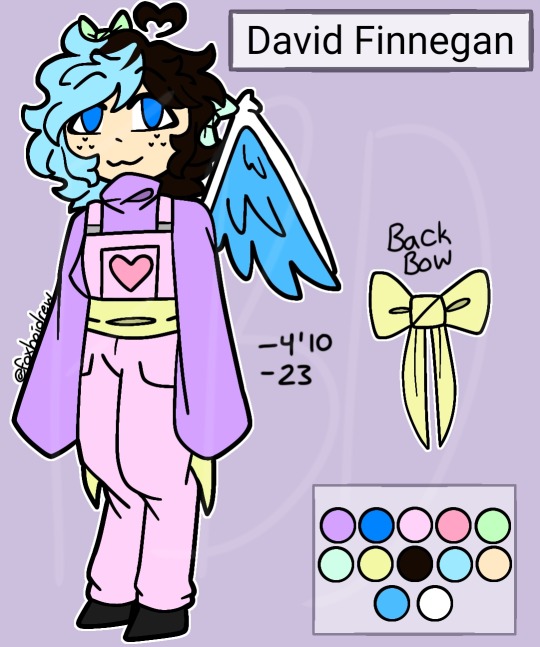
Aka a David reference sheet!!
His backstory can be found here!
#my art#drew rambles#oc art#oc reference#oc ref sheet#oc refrence sheet#reference sheet#david finnegan#oc david#drew's ocs#drew's references
4 notes
·
View notes
Text
[cw teeny bit of blood]
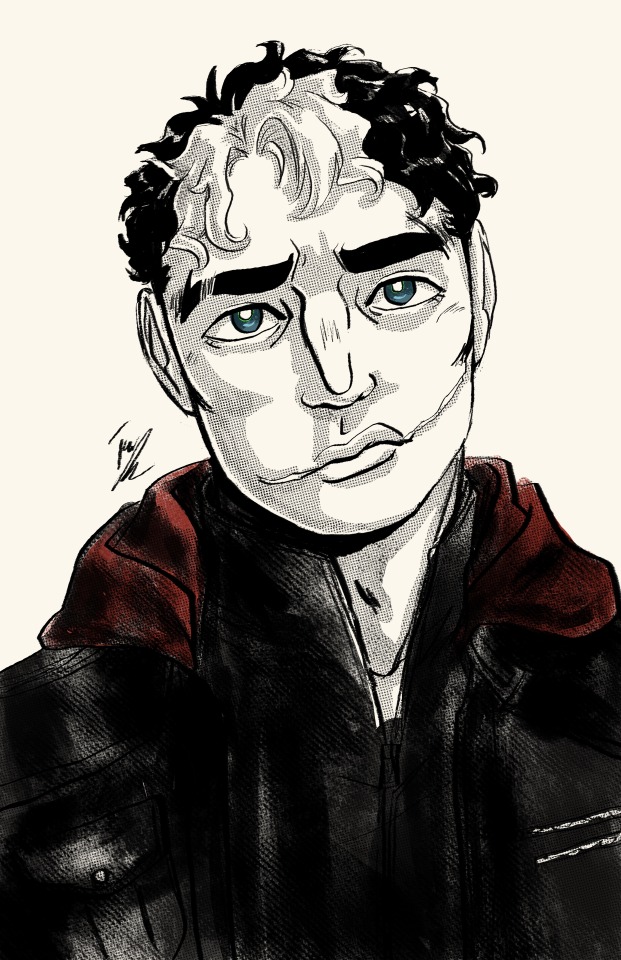
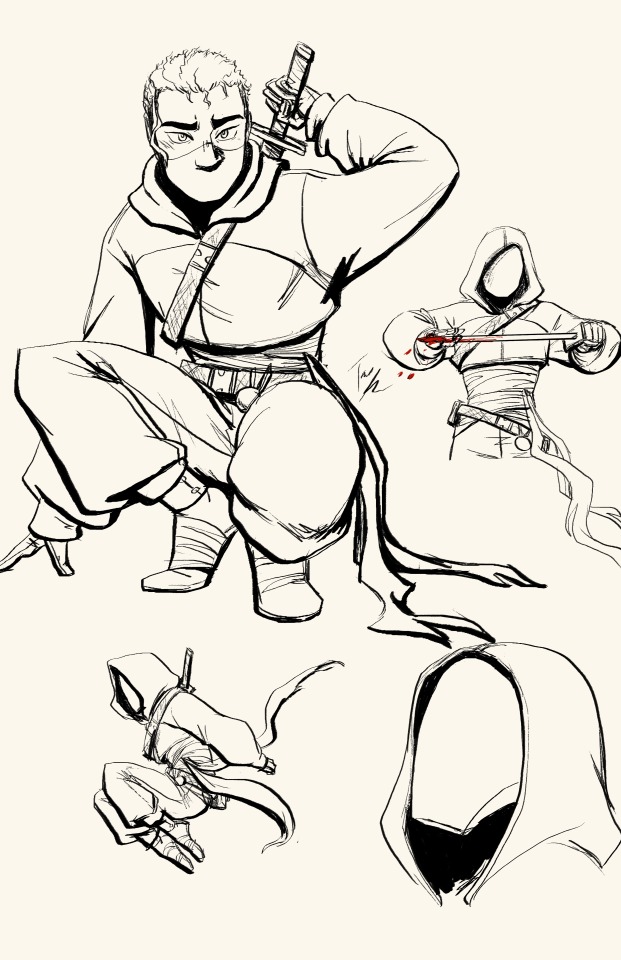
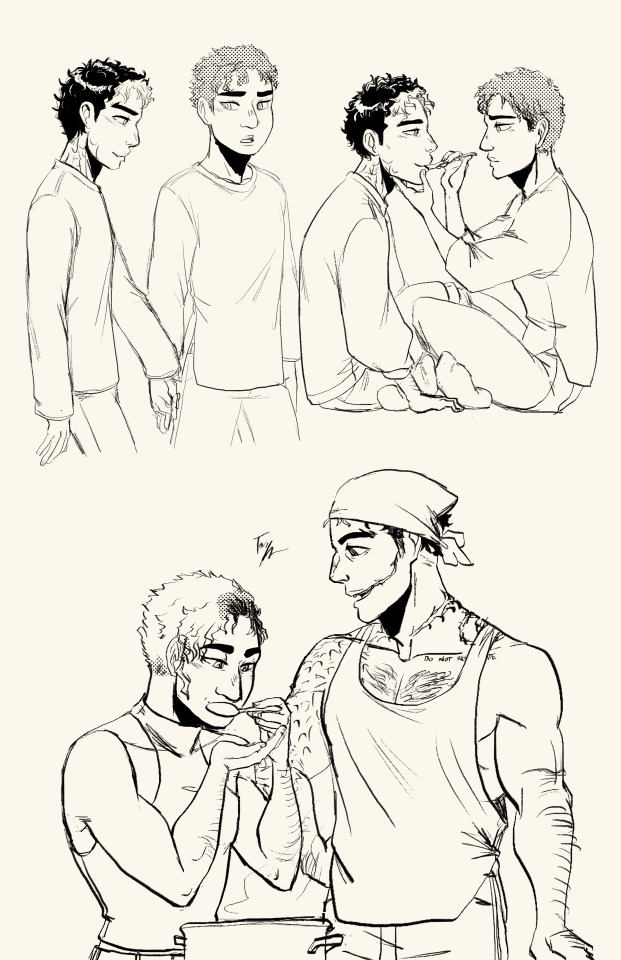
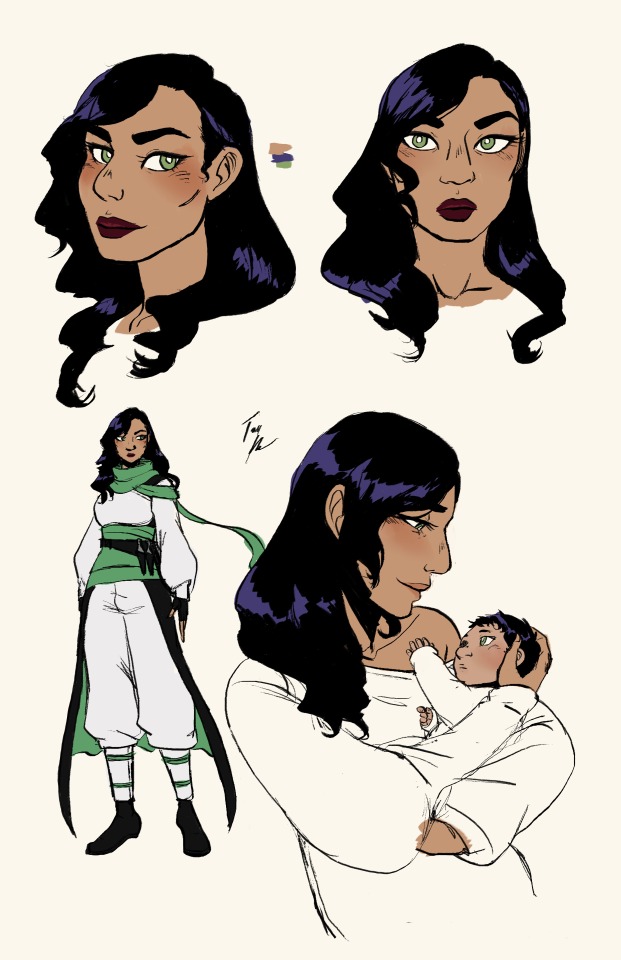

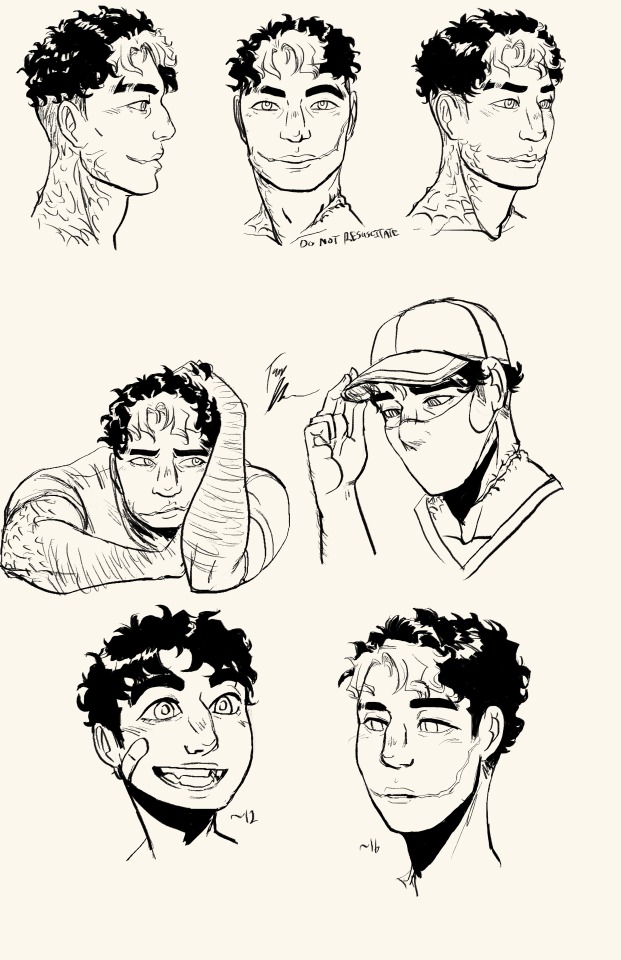

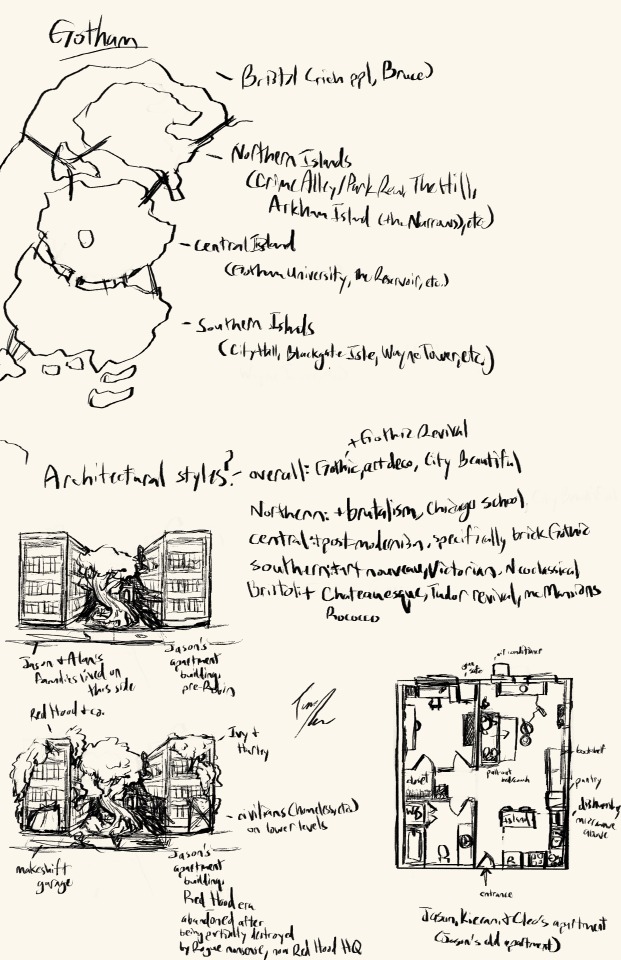
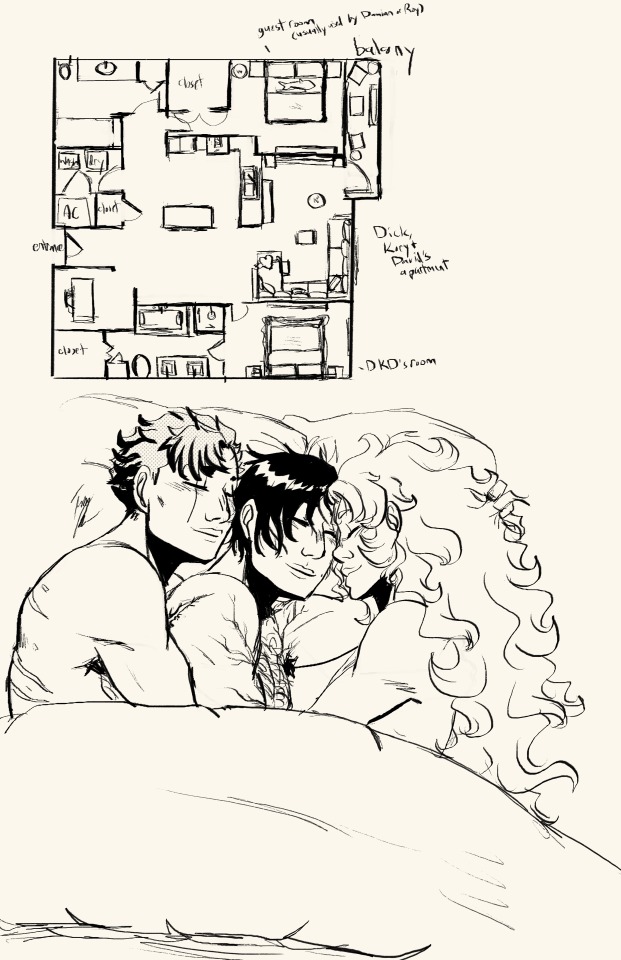
Return of the RH: Prometheus digital sketchbook, feat. a doodle of Jason’s previous face design and playing around with brushes, a couple of pages with resident oc Kieran (one page costume design current version, one page relationship with Jason), Talia rough design feat. baby Damian, Cleo costume and prop design current version + doodle of her and her dads when they were alive, current version of Jason’s face with early Robin era and semi-catatonic era versions, current version of Bruce with him being very unkind about Jason post-death and -return as a terrible coping mechanism, and a couple of pages re: Gotham and rough layouts for Jason+Kieran+Cleo and Dick/Kory/David’s apartments, feat. a doodle of David, Dick, and Kory in bed together
#red hood prometheus#jason todd#whatever tag I end up using for Kieran#talia al ghul#cleo cazo#bruce wayne#david sikela#dick grayson#koriand'r#damian wayne#otis finnegan#Cleo’s first dad who apparently doesn’t have a canonical first name?#red hood#ratcatcher 2#batman#thunderman#nightwing#dc starfire
88 notes
·
View notes
Text
youtube
Listening to Hyperdrama by Justice be like Not iceberg or soul eater related (besides a cameo), but still put effort into making this and I am "proud" of it unlike of low-effort memes, so thats why I'm sharing this, even considering this blog is mostly retired. Also, long live Justice, dont care if haters dont see the beauty
#Justice#justice band#justice music#hyperdrama#ost#listening be like#listening on shuffle be like#the passion of the christ#gtr r34#zoolander#scarface#russian dancing#spongebob#david lynch dune#twin peaks#nightcrawler#mars attacks#butterfly#soul eater#croma kinda#Michael Jackson#Ashita no Joe#finnegans wake#Youtube
2 notes
·
View notes
Text
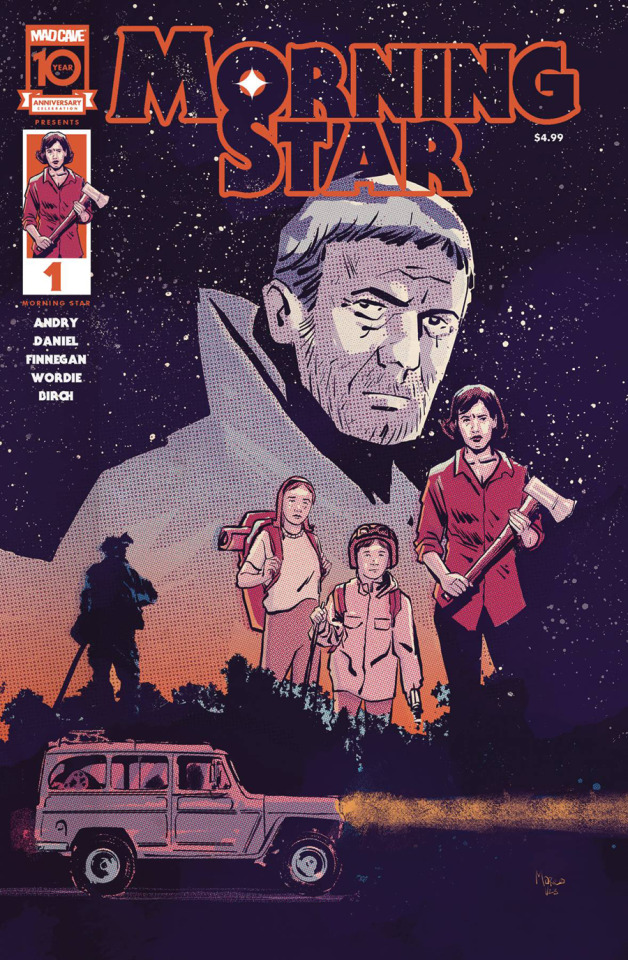
Out this week: Morning Star #1 (Mad Cave, $4.99):
Tim Daniel, David Andry and Marco Finnegan team up for the story of the widow of a smokejumper whose husband died under mysterious circumstances — which come back to haunt her and her family as she tries to scatter her husband’s ashes.
See what else is arriving at your local comic shop this week.
#morning star#mad cave studios#comics#comic books#new comic book day#ncbd#new comics#new comics day#new comics wednesday#tim daniel#david andry#marco finnegan
4 notes
·
View notes
Note
hi! what about 16 for bea duke/ben hobbes and ava walcott/dylan finnegan? (and asher/david if u wanna let me be self indulgent lol)
hi jules!
for beadick, i would absolutely love to see them in a doctor who au, esp one where bea's the doctor and ben's her companion. they would give off such amy/rory vibes
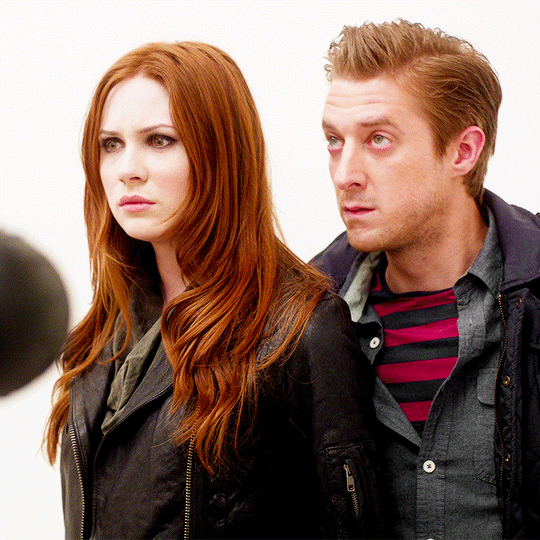
for ava x dylan, i think seeing them in a high school au would be fun! seeing what they were like as younger teens, and esp how dylan was dealing with their mental health as a teen would be very interesting. plus ava giving dylan a chemistry themed promposal would be adorable.
and then for asher and david, i would love to see them in a to all the boys i've loved before au!! david writing love letters to everyone he's loved before, and asher being on the list

#nothing much to do#the roedell project#public history#beadick#beatrice duke#benedick hobbes#ava walcott#dylan finnegan#falcott#david copperfield#asher wickens#Dasher#jules tag#asks
4 notes
·
View notes
Text
Preview: Morning Star
Morning Star preview. When smokejumper Nathan Garrett perishes in a raging wildfire, his surviving family's hopes and happiness turn to ashes #comics #comicbooks
#david andry#jason wordie#justin birch#mad cave studios#marco finnegan#morning star#tim daniel#trade paperback#trade paperbacks
0 notes
Photo

Sorry @selkiesstories but your comment about DG being the romance version of GRRM just sent me because it's so damn true. 😂💀
I'm honestly in the same position. I've already more than had my fill of the cesspool that is OL (hell, I stopped watching the show after S4 because I know all the crap that happens in the later books and just went, "nope! no thanks!"), but the one relationship I still love in the books is John & William's (and John & Brianna, too)...so I'm tempted to at least watch their scenes.🥺




OUTLANDER 4.06
-Papa!
157 notes
·
View notes
Text
Star Trek TOS crew biographies
There are plenty of detailed biographies of the TOS crew, both online and in reference books. But I wanted to check what actually appears in the Original Series and the six TOS movies about this subject (that is, not counting secondary sources or later series). And the result is... very little, actually. I was surprised by the amount of data that I took for granted, just to find out it came from a novel or wasn't 100% set in stone. This is what I could find about each major character, just judging from the TOS series and movies. Feel free to add to this or correct mistakes.
James Tiberius Kirk:
Although in the series he's referred just as James T. Kirk, his middle name "Tiberius" appears in Star Trek VI. "Tiberius" was also his middle name in TAS episode Bem, and the novel The Galactic Whirlpool (both by Gerrold), as well as in Roddenberry's TMP novelization. So yeah, no doubts about his name.
He was born in Iowa (Star Trek IV) and had one brother, George Samuel Kirk, and three nephews (What are little girls made of?). Sam married a woman named Aurelan (Operation: Annihilate).
Kirk was 34 in The Deadly Years. Assuming each season is a year of the five year mission, he could be 33 at the start of the series. And this is the only reference for his age I could find. As for actual dates, I didn't find anything, except his statement in Star Trek IV that he comes from the late 23rd century. (It wouldn't be until Voyager episode Q2, that a date was given for the end of the five-year mission: 2270. This follows Michael Okuda's Star Trek Chronology, and all other dates for TOS are inferred from this).
At age 13 he witnessed the massacre of Tarsus IV (Kodos was governor twenty years ago, in The Conscience of the King).
At age 18 he had just entered the Academy and was tormented by Finnegan. At this time he also met Ruth (fifteen years before Shore Leave).
He served in the USS Republic as an ensign, at some unspecified time after his Academy years, where he reported Ben Finney for negligency (Court Martial).
At age 21 he visited the planet Neural and befriended Tyree (thirteen years before A private little war).
He teached at the Academy as a lieutenant. One of his students was his friend Gary Mitchell (Where No Man has Gone Before).
He was a lieutenant in the USS Farragut at age 23 (eleven years before Obsession), where he first encountered the cloud creature that massacred his crewmates.
Kirk had a relationship with Areel Shaw when he was 29 (four years before Court Martial).
He became captain of the USS Enterprise after Pike. If we suppose TOS first season happens during the first year of the five-year mission, Kirk was around 37 at the end of this mission.
There's a big gap of fifteen years between Space Seed and the second movie. And apart from the five-year mission, most of those years are unaccounted for. Kirk's been an admiral for two years and a half at the start of TMP. But we don't know if he became an admiral right after the Enterprise's mission, or much later. That is, we don't know at what point of that gap take place the events of TMP. Around this time, both Spock and McCoy had retired from Starfleet, though they both returned when Kirk took the Enterprise again for the V'Ger incident.
By The Wrath of Kahn, Kirk should be 48 years old (fifteen years since he left Kahn stranded in Space Seed). If David is around 30, Kirk's relationship with Carol could have been at the Academy, but it's also possible that David is younger.
The third and fourth films happen shortly after The Wrath of Kahn, but no idea how much time elapsed since then and the fifth and sixth films (though see the info for McCoy).
Spock
Known simply as "Spock". His full name is considered unpronounceable for humans, though the novel Ishmael gives it as "S'chn T'gai Spock".
His parents are Sarek and Amanda (Journey to Babel). Amanda's last name was never given, though TAS episode Yesteryear, some novels, and the 2009 reboot film establishes it as "Grayson". Spock also has a half-brother: Sybok (Star Trek V).
I couldn't find anything about Spock's actual age during the series/movies.
He was betrothed to T'Pring at age seven (Amok Time).
He probably joined Starfleet eighteen years before Journey to Babel, since that's the time he spent not speaking with Sarek. If he joined Starfleet at 18 years old, he'd be 36 by season two (but that's just a supposition).
He was part of Pike's crew thirteen years before The Menagerie, during the events in Talos IV. He'd be 22 by then. Spock served under Pike for eleven years (also from The Menagerie). That means Kirk had been captain of the Enterprise for at least two years before season one.
After that, Spock's career runs more or less in parallel with Kirk's, so I won't go over it again.
Leonard H. McCoy
His middle initial first appears in Star Trek III, as well as the name of his father: David. The novel Provenance of Shadows explains the middle initial as "Horatio", but other novels call him "Leonard Edward McCoy" (???).
Much of his biographical background comes from the "Writer's Guide" by Roddenberry and Fontana, but never made it to the series. That includes the fact he's 45 (by season one?) and born in Georgia. As well as the fact that he's divorced and joined Starfleet as a result of this, and that he has a 20 year old daughter (Joanna). Presumably, the story of his divorce and Joanna would have appeared in The Way to Eden, but the story was severely altered. His daughter is mentioned, but without name, in TAS episode The Survivor, and in several novels. The Gold Key comics call her "Barbara" instead. His ex-wife is given different names in the novels and comics: Honey, Jocelyn, Joan, Gillian...
No idea when he joined Starfleet (that depends on how long was his marriage), or when he met Kirk.
Ten years before The Man Trap, he had a romance with Nancy Crater. Though in the episode he sometimes says he knew her twelve years ago, and other times ten years ago. Either it's a mistake, or the relationship simply lasted two years (though McCoy's doubts about Nancy remembering him, imply the relationship wasn't very long).
At some point, he visited Capella IV for a few months (Friday's Child).
He served in the Enterprise for 27 years (Star Trek VI), but only under Kirk, it seems. If he was 45 when he started, he'd be 72 in the last film, and Kirk would be 60 years old.
Note on McCoy's age in later series
The "Writer's Guide" statement that McCoy was 45 at the time of TOS, was contradicted by later series. In TNG episode Encounter at Farpoint, he's said to be 137 years old. While in the episode The Neutral Zone (also from TNG season one) the year is 2364. As both episodes probably happen in the same year, McCoy would have been born in 2227. Since, according to Voyager, the five-year mission lasted from 2266 to 2270, McCoy would have been 39 at the start of the mission. I'm following the Writer's Guide figure, however, because I consider this document more relevant for TOS itself. After all, many things that are facts in later series, aren't the same in TOS, and viceversa. Also, considering that the age of the characters seems to be close to the age of the actors, I find more likely that McCoy was 45, and not 39, at the start of TOS. To give you an idea, Shatner was 36 in season two (Kirk was 34), Nimoy was also 36 (just as Spock) and Kelley was 47. The twelve year gap between Kirk and McCoy, would be almost the same as the eleven year gap between Shatner and Kelley.
Montgomery Scott
Very little about him, but at least we got his full name in the series. He's supposed to be Scottish, and has lived in Aberdeen (Wolf in the Fold).
Apart from being Chief Engineer in the Enterprise, he was engineer advisor in a freighter, running from Deneva to the asteroid belt (Operation: Annihilate).
Uhura
We never knew her first name in TOS! This is one of the things that surprised me the most. However, "Nyota" is her first name in the reboot films, the new series, and well before that, the novel The Entropy Effect.
She was probably born in east Africa, since her native language seems to be Swahili (the language she reverted to when her memory was wiped in The Changeling). Thanks to user @sapsuckers-and-stardust for pointing this out.
Very, very little about her bio background. Most of it has to be collected from novels or comics, and those never intended to be coherent with each other.
Hikaru Sulu
Though his first name was unknown for a long time, it was revealed to be "Hikaru" in Star Trek VI. But before this, he was also called Hikaru in The Entropy Effect.
Sulu was born in San Francisco (Star Trek IV).
Again, almost nothing of his bio in the series/movies. Though the DC comics explored his character significantly. And in Star Trek: Generations, he had a daughter, Demora.
By Star Trek VI, he was finally a captain of his own ship, the Excelsior.
Pavel Andreievich Chekov
His full name appears first in The Way to Eden, where we also learn he had a romance with Irina Galliulin at the Academy.
Chekov has no siblings (Day of the Dove).
He's 22 by season two (Who mourns for Adonais?).
After serving in the Enterprise, he was first officer in the USS Reliant during The Wrath of Kahn, though he returned with Kirk after the Reliant's destruction.
Christine Chapel
She abandoned her career in bio-research to sign aboard the Enterprise as a nurse, and search after her fiancé Roger Korby (What are little girls made of?) Strangely enough, a few episodes before, she had confessed her love for Spock. She chose to stay in the ship after finding out Korby was dead.
By the time of TMP, she was a doctor in the Enterprise, though she doesn't appear as part of the crew in the later movies.
Janice Rand
She served as a yeoman in the Enterprise during the early five-year mission, but disappears from the series afterwards.
In TMP, she's the transporter chief. And in Star Trek IV, Janice is seen at Starfleet Command, along with Chapel.
By Star Trek VI, she was the communications officer of the Excelsior, under Sulu.
#star trek tos#reference#biographies#star trek tos crew#james kirk#spock#leonard mccoy#uhura#montgomery scott#hikaru sulu#pavel chekov#christine chapel#janice rand
154 notes
·
View notes
Text
Making sense of Kirk's Timeline
It's another day for thoughts of Jim Kirk 😩
Little Jimmy stuck on Tarsus IV at the ripe ole age of 13, forced into a leadership position to protect younger kids, sentenced to death because he was deemed lesser and unfit for living. And then being "rescued" soon after by the late Starfleet ships.
Between the ages of 19-21, he became a cadet and was instantly bullied by Finnegan. Around the age of 21, he beat the Kobayashi Maru, and met Benjamin Finney. His relationship with Finney was so close, Finney named his daughter after Jim.
Possibly graduated Starfleet Academy at the age of 21 and granted ensign rank and boarded the Farragut.
At some point**, boards the Republic and meets Finney again, and got Finney reprimanded and demoted. Eventually boards the Farragut. Meets Tyree, inhabitant of Neural, at the age of 22.
At the age of 24, faces off against the Dikironium cloud creature at Tycho IV. Blames himself for the death of half his ship crewmates, including his Captain at the time.
Ages 24-26, possibly after the Tycho IV disaster, Jim comes back to the academy as an instructor and meets Janice Lester, they have a relationship for a year before it falls apart due to Janice Lester's bitterness. Sometime in the next year, Jim meets Gary Mitchell, who probably introduced him to Carol Marcus, the "little blond lab technician". In the couple of years as an instructor, Jim gained a reputation as a "stack of books with legs" and a "you either think or sink" professor, who nearly flunked Mitchell out of the academy.
At the age of 26, becomes the youngest first officer in starfleet (due to his commendations from the Tycho IV incident), breaking his father's record. In the same year, Pike shows interest in him as a potential successor due to time travel shenanigans. The same year, his on again off again girlfriend becomes pregnant with their son, David. Jim also meets Uhura, Spock, presumably Chapel and Mbenga this year.
At the age of 27, Jim is officially a father, but his relationship with Carol Marcus is presumed to have ended and he is not allowed in his son's life.
Between the ages of 27-32, probably more horrors to witness. 😭💀
Becomes youngest Captain, Captain to the Enterprise at the age of 32.
Ages 32-37, Jim Kirk captains the Enterprise and goes through an insane amount of trauma.
Age of 37, Jim becomes admiral and recommends Will Decker to be his successor. Spock leaves to purge his emotions. Jim is earthbound.
Three years later, Jim is 40, TMP occurs, the Enterprise goes on it's next five year mission.***
** Much like Jim boards the Enterprise sometimes, it seems he's done this to other ships as well, which can possibly be how he met up with Finney again on the Republic. Wikia mentions Kirk being a midshipman but that doesn't make any sense, and likely retconned out because of that.
*** There doesn't appear to be any consistent answer to how much time took place between TOS and TMP, but imo, I like the idea of the original timeline taking place at the years of release but in 2200s, so I'm sticking with that and ignoring inconsistencies.
**** Some information had to be rearranged and timing hypothesized due to vague canon descriptions. I went for what made sense. Idk what the standard cadet schooling is, but boy, it seems like Jim excelled.
#Where No Man Has Gone Before and Then Some#star trek#star trek tos#star trek snw#strange new worlds#jim kirk#personally I hope jim goes through more horrors between ages of 26-32#I love angst
36 notes
·
View notes
Text
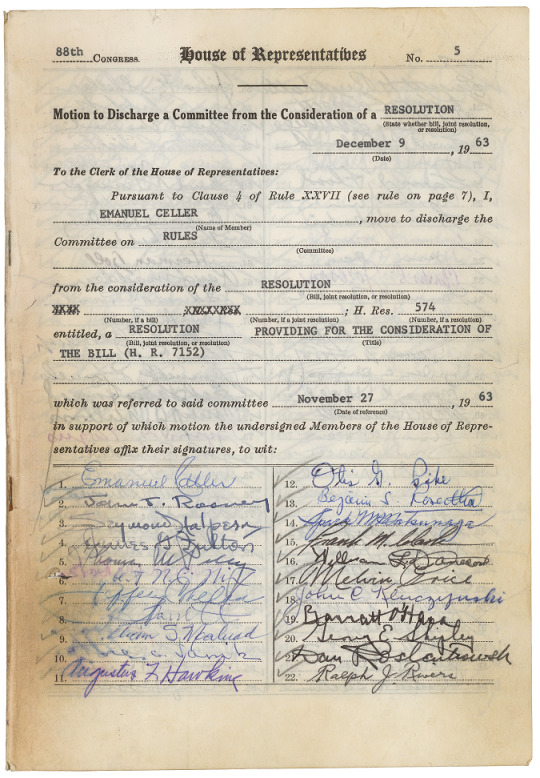
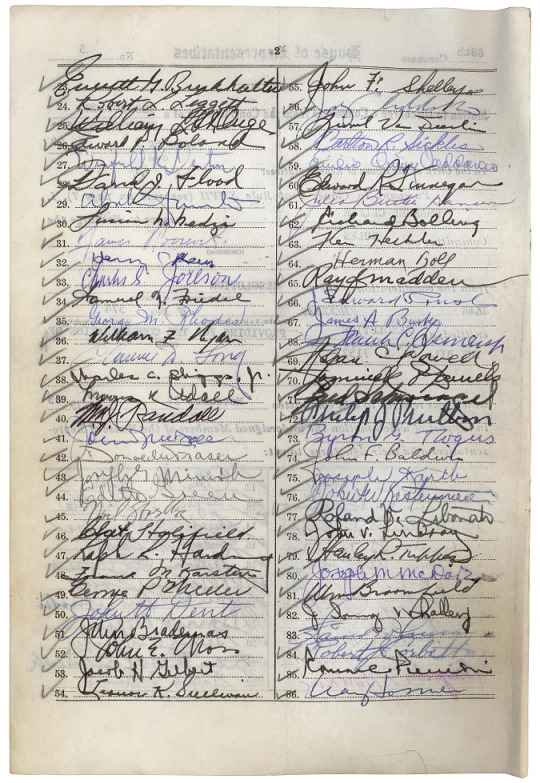
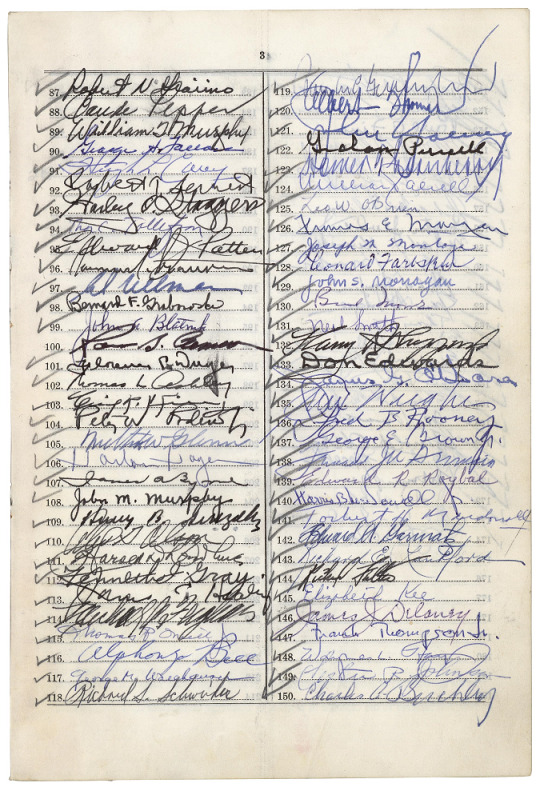

Discharge Petition for H.R. 7152, the Civil Rights Act of 1964
Record Group 233: Records of the U.S. House of RepresentativesSeries: General Records
This item, H.R. 7152, the Civil Rights Act of 1964, faced strong opposition in the House Rules Committee. Howard Smith, Chairman of the committee, refused to schedule hearings for the bill. Emanuel Celler, Chairman of the Judiciary Committee, attempted to use this discharge petition to move the bill out of committee without holding hearings. The petition failed to gain the required majority of Congress (218 signatures), but forced Chairman Smith to schedule hearings.
88th CONGRESS. House of Representatives No. 5 Motion to Discharge a Committee from the Consideration of a RESOLUTION (State whether bill, joint resolution, or resolution) December 9, 1963 To the Clerk of the House of Representatives: Pursuant to Clause 4 of Rule XXVII (see rule on page 7), I EMANUEL CELLER (Name of Member), move to discharge to the Commitee on RULES (Committee) from the consideration of the RESOLUTION; H. Res. 574 entitled, a RESOLUTION PROVIDING FOR THE CONSIDERATION OF THE BILL (H. R. 7152) which was referred to said committee November 27, 1963 in support of which motion the undersigned Members of the House of Representatives affix their signatures, to wit: 1. Emanuel Celler 2. John J. Rooney 3. Seymour Halpern 4. James G Fulton 5. Thomas W Pelly 6. Robt N. C. Nix 7. Jeffery Cohelan 8. W A Barrett 9. William S. Mailiard 10. 11. Augustus F. Hawkins 12. Otis G. Pike 13. Benjamin S Rosenthal 14. Spark M Matsunaga 15. Frank M. Clark 16. William L Dawson 17. Melvin Price 18. John C. Kluczynski 19. Barratt O'Hara 20. George E. Shipley 21. Dan Rostenkowski 22. Ralph J. Rivers[page] 2 23. Everett G. Burkhalter 24. Robert L. Leggett 25. William L St Onge 26. Edward P. Boland 27. Winfield K. Denton 28. David J. Flood 29. 30. Lucian N. Nedzi 31. James Roosevelt 32. Henry C Reuss 33. Charles S. Joelson 34. Samuel N. Friedel 35. George M. Rhodes 36. William F. Ryan 37. Clarence D. Long 38. Charles C. Diggs Jr 39. Morris K. Udall 40. Wm J. Randall 41. 42. Donald M. Fraser 43. Joseph G. Minish 44. Edith Green 45. Neil Staebler 46. 47. Ralph R. Harding 48. Frank M. Karsten 49. 50. John H. Dent 51. John Brademas 52. John E. Moss 53. Jacob H. Gilbert 54. Leonor K. Sullivan 55. John F. Shelley 56. 57. Lionel Van Deerlin 58. Carlton R. Sickles 59. 60. Edward R. Finnegan 61. Julia Butler Hansen 62. Richard Bolling 63. Ken Heckler 64. Herman Toll 65. Ray J Madden 66. J Edward Roush 67. James A. Burke 68. Frank C. Osmers Jr 69. Adam Powell 70. 71. Fred Schwengel 72. Philip J. Philiben 73. Byron G. Rogers 74. John F. Baldwin 75. Joseph Karth 76. 77. Roland V. Libonati 78. John V. Lindsay 79. Stanley R. Tupper 80. Joseph M. McDade 81. Wm Broomfield 82. 83. 84. Robert J Corbett 85. 86. Craig Hosmer87. Robert N. Giaimo 88. Claude Pepper 89. William T Murphy 90. George H. Fallon 91. Hugh L. Carey 92. Robert T. Secrest 93. Harley O. Staggers 94. Thor C. Tollefson 95. Edward J. Patten 96. 97. Al Ullman 98. Bernard F. Grabowski 99. John A. Blatnik 100. 101. Florence P. Dwyer 102. Thomas L. ? 103. 104. Peter W. Rodino 105. Milton W. Glenn 106. Harlan Hagen 107. James A. Byrne 108. John M. Murphy 109. Henry B. Gonzalez 110. Arnold Olson 111. Harold D Donahue 112. Kenneth J. Gray 113. James C. Healey 114. Michael A Feighan 115. Thomas R. O'Neill 116. Alphonzo Bell 117. George M. Wallhauser 118. Richard S. Schweiker 119. 120. Albert Thomas 121. 122. Graham Purcell 123. Homer Thornberry 124. 125. Leo W. O'Brien 126. Thomas E. Morgan 127. Joseph M. Montoya 128. Leonard Farbstein 129. John S. Monagan 130. Brad Morse 131. Neil Smith 132. Harry R. Sheppard 133. Don Edwards 134. James G. O'Hara 135. 136. Fred B. Rooney 137. George E. Brown Jr. 138. 139. Edward R. Roybal 140. Harris. B McDowell jr. 141. Torbert H. McDonall 142. Edward A. Garmatz 143. Richard E. Lankford 144. Richard Fulton 145. Elizabeth Kee 146. James J. Delaney 147. Frank Thompson Jr 148. 149. Lester R. Johnson 150. Charles A. Buckley4 151. Richard T. Hanna 152. James Corman 153. Paul A Fino 154. Harold M. Ryan 155. Martha W. Griffiths 156. Adam E. Konski 157. Chas W. Wilson 158. Michael J. Kewan 160. Alex Brooks 161. Clark W. Thompson 162. John D. Gringell [?] 163. Thomas P. Gill 164. Edna F. Kelly 165. Eugene J. Keogh 166 John. B. Duncan 167. Elmer J. Dolland 168. Joe Caul 169. Arnold Olsen 170. Monte B. Fascell [?] 171. [not deciphered] 172. J. Dulek 173. Joe W. [undeciphered] 174. J. J. Pickle [Numbers 175 through 214 are blank]
33 notes
·
View notes
Text
Coffee for One
A small drabble for my tsams Guilt AU. This au will also feature some ocs, but it's very v2 Eclipse centered.
I don't think there's really any warnings, but please let me know if there are.
Eclipse sighed as he walked through the small town near his place. He felt like crap, so what better way to feel arguably worse with some caffeine? Avoiding the eye contacts of the mix of animatronics and humans, he walked into the local coffee shop bakery.
A happy voice greeted him, a strained and shy voice, but chipper all the same. “Welcome, welcome! How can I help you today, Eclipse?”
“Hey, David. Just a black coffee with minimal milk and sugar, please…”
“Coming right up,” David giggled as he turned to start making the order.
David was always a bright character to Eclipse, personality wise and clothes wise. The man was always wearing pastels, to the point it would sometimes hurt Eclipse's eyes. But, the barista was nice, and that's all that mattered to him.
“Say, Eclipse,” David started, setting the coffee on the bar in front of the man in question, “Are you okay? You look exhausted.”
“Didn't get any sleep last night. I could hear those voices again. I think one of those things tapped on my window.”
“Why don't you live here with the townsfolk? Wouldn't it be safer? To have that distraction?”
“Not the social type. It's too loud here, honestly. Besides, I already deal with my own demons, I can't handle others. You hear them too, don't you?”
David went silent, gripping at his sleeve with an almost distant stare. Eclipse could have sworn he saw the poor boy tear up. He watched as David shook himself, and almost scarily switched to his more chipper self. “Yeah! B-but it's- it's- it's not real! S-so it's okay!” …even if the front was flawed.
“So you do. You know that they're re-”
“Let me have this… please…” David muttered, staring at Eclipse with watery eyes. It was clear he wanted to believe himself.
Even if it was just fear in those eyes, it shook Eclipse to his core. Images of Lunar flooded his mind. Seeing the sheer terror of the smaller bot as he begged for his life. The sound of a faint explosion brought him back to reality. “...Sorry.”
But David wasn't there. Eclipse figured he went to calm himself. Fixing his coat, and grabbing his coffee, Eclipse left to go home…
#tsams#the sun and moon show#tsams au#guilt au#tsams eclipse#david finnegan#oc david#my writing#i cannot write for shit I'm sorry
5 notes
·
View notes
Text
It really frustrates me when I go into threads about JK Rowling, because there are plenty of legitimate reasons to hate her, but most of the comments are completely made up reasons? Please don't lie and spread misinformation even about people you dislike, because it'll make your own position look weaker under scrutiny.
If you need to lie to make a point, people will think it's because you don't have one. So don't lie in the first place.
Not reasons to hate JKR:
- there is a star of David on the floor of Gringotts bank. This was in the movies, it was not described in the books. Unless evidence comes out that she asked Chris Columbus or whoever for that detail to be included, it is not evidence of antisemitism (that is not to say that the goblins in general aren't problematic though)
- she didn't say Hermione was black all along, she said casting a black actress as Hermione doesn't contradict her description (although it does)
- all the retconning and "oh actually X character was Y all along" after the series has ended. This isn't "problematic", it's just cringe. Nothing to get mad about
- she did not retcon Dumbledore as being gay after the series ended. I distinctly remember this being a topic of discussion while the 6th book was coming out. She didn't include it explicitly in the books, but it wasn't an after-the-fact change (Although it is a valid criticism that not including it explicitly in the books means it isn't representation)
- Seamus Finnegan being a clumsy Irishman who makes things explode. This was in the movies, not the books. In the books it was often Neville who was used for this comic relief
- she's a bad writer. I'm not saying this is incorrect, just that it's not a reason to hate her. People don't deserve hate for being bad at something, she deserves hate because she is a bad person. Please do not conflate these two; it is possible for bad people to make good art and it's possible for good people to make poor art. A lot of this insistence comes from people who used to be big fans of Harry Potter who now that they don't like her any more are now saying "well the books were shit all along anyway..." It just seems performative tbh.
- a trans character in Hogwarts Legacy being named "Sirona Ryan". Honestly this is the biggest stretch I've ever seen. Look - there's plenty of things to criticise about this game. The fact that one of the early writers was apparently a bit fashy and is responsible for the leaning even further into the goblin antisemitism for example. But this one character? I highly doubt JKR even had to approve of details that small, let alone the fact that the name likely isn't problematic at all. If you're reading this and, like me, you have no clue whatsoever what is apparently wrong with the name - it begins with "Sir" - implying that trans women are actually men, and ends with "Aryan" - implying that trans people are nazis. At this point, people are actively looking for things to get mad about even when they're not there. I'm not even sure the "sir" in "Sirona" is even supposed to be pronounced like the English word. How about getting mad about the actual obvious actually harmful things she does instead???
Actual reasons to hate her:
- her transphobic tweets
- the fatphobia in the books
- her transphobic articles
- the whole "Hermione is dumb for being anti-slavery" subplot
- her transphobic actions
- lack of regard for other cultures, whether it's the naming of foreign characters and places, or the fact that the wizarding Irish government apparently still isn't independent of the UK's
- her defending and associating with people more mask-off transphobic than she is
- she is a billionaire, and there are no good billionaires
Inb4 "how dare you defend this bad person" - correcting misinformation about a bad person is not defending them. Good people should also care about intellectual honesty. It isn't good to lie about someone just because the person you're lying about is bad.
21 notes
·
View notes
Note
Hello! I was appreciatively looking through your blog, and was curious: in a reblog of a Baudrillard quote (something like “Art is dead … [and] … has been confused with its own image”) you disagreed in the tags. I’d love to know your thoughts on why, if you don’t mind sharing them.
[i’ll post the Baudrillard quote in question below, for people just coming across this]
Hello, thanks for your question, and kind words; I don’t mind at all.
First, and most importantly of all. ‘Art is dead.’ In contemplating this statement: abjure your intellect and instead, for a moment, listen to the body. Ask yourself what you experience, and whether art is alive.
After that try this: make a slightly pouty, disappointed face and, one fist against your hip, say aloud ‘Art is dead !!’ … without making yourself laugh.
Baurdrillard’s in a funk here and just talking big. I recognise this line of thinking in myself sometimes. Speaking in large round denunciations is a real kick. I don’t castigate him for this, and his writing is well formed and provocative. Fine qualities, in my book — yet at source, this particular sentiment is merely a semi-hysterical reaction to sheer satiation of data I think, a point of view formed beyond the boundary line of dissipation. One reads, listens, views, discusses, dreams even, incessantly … until you reach a point where reference and connection, in everything, endlessly spools and crisscrosses in a sort of Borgesian organised-chaos and, often, instead of being pleasurably intoxicated by this, it induces in one a kind of wrecking impulse. I think a certain sort of person – a bit grandiose this but let’s call them art-worshippers – I think most of us feel this dissipation from time to time. The ego plays a big part in this too: ‘I see all their tricks; they can’t fool me.’ After writing the Sirens episode in Ulysses Joyce, the great music lover, complained for years that he couldn’t enjoy it any longer. Explaining this in a letter he said miserably, ‘Music: I can suddenly see through it all.’
Oddly enough and pertinent to Baudrillard’s statement, I read a curious book this year, non-fiction, called ‘Reality Hunger’ by David Shields. The title alone does a lot of the heavy lifting for me in trying to explain it, but broadly he explores through our various conditional responses to art our corresponding sense of reality – the pleasurable and its obverse – in a collection of around 600 quotes he’s gathered over the decades, interspersed with his own thoughts and observations: crucially, after each aphoristic reference, some generationally famous, many less so, and of course his own original words, he never states who the quotes are from (for legal reasons he begrudgingly appends their names at the back of the book, but provides a cutting line on the inner margin of each page and asks you to take the scissors to them) and so it forms after not very long an ever-increasing eerie experience for the reader with the effect of creating a curious interplay and loop of reference that, in the end, is seemingly connected to everything else certainly within but also much externally; becoming in totality, for me at least, its own living artistic expression. Now, this is fascinating because Shields on many days you suspect would wholeheartedly agree with the Baurdillard statement and yet, by dint of his own book, one often expressing this concord of feeling, proves it defunct.
Joyce, via his obsession with the enlightenment historian and philosopher Giambattista Vico, is the great artistic patron of this cyclical motif, where everything is (or was; or will be in the future) potentially everything else, and history itself, over large swathes of time and incalculable complexity, falls within the gravity and metric of some unknown universal fractal-like law. Both Ulysses and Finnegans Wake, I’d argue, above all other characteristics, is about this, and where for Baurdrillard (at least here) this is a drag, for Joyce it is the life and wellspring of all art and, indeed, human existence.
——————————————-

6 notes
·
View notes
Text

Angry at the world in general and John's stubbornness specifically, Daniel felt like beating up at least five people (this is is current soul journey goal). He went to the police department, central station, where he spotted a patrol android in the company of Captain Allen. That called for a spontaneous spook!
David: "What's wrong with the lights all of a sudden? I need to tell Miller when she checks in for her shift."

Eloise: Allen practising shadow boxing in the reception area? Those SWAT guys really are a different breed.

Daniel felt a pang of guilt when he saw that the precinct's captain had brought his little son to work that day. This man was a father just like Daniel had been to Emma!
But Fowler was the leader of this gang, that had assaulted, betrayed and killed Daniel. There'd be no quarter for him today!

Next the officers Deckart and Wilson, despite being as dead as Daniel, got their fat (again). Unlike the humans and the androids, the two ghosts were able to see Daniel, so it wasn't as easy as beating up Allen and Fowler.

Daniel didn't want to face Connor again, so he didn't stay around to wait for the RK800 to report to duty. Instead he found an officer on patrol, whom he attacked as his fifths victim.
To the people at the town square it looked as if Officer Finnegan had just attacked something imaginary. Well, his job was stressful, so that probably was to be expected...
3 notes
·
View notes
Text
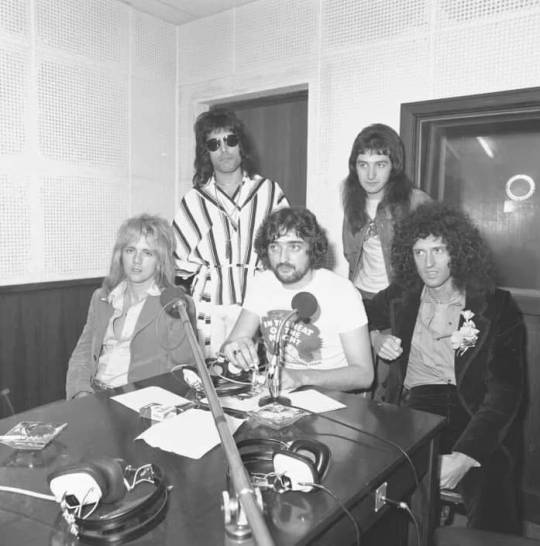
Queen Gazette, "Back at the Hotel Sleazy", 9 jun 1976. By Ann Finnegan.
For all those fans who were misled by the media,
Queen did not spend a couple of days-relaxing on sunny
Perth beaches - it rained the whole bloody time they
were there. (In Melbourne the hotel was 'besiged' by
fans, who to quote Pete Brown — Queen's personal
manager - seemed to be emergirig'from the wood work).
Not to be put off however, by the Australian conditions
Freddie Mercury (lead vocals and keyboards) attended
the press conference in white pants and a simply
sumptuous summer synthetic top with delicate butterfly
sleeves curling gently over his shoulders. He was
even more beautiful than Sophia Loren.
They were all quite chatty only Roger (Meddows-
Taylor, the drummer) would keep interjecting, usually
over John Deacon (bass) who said not an audible word.
Q&A :
Press: WouId you describe your music as mock opera?
Freddie: They call it cock-opera back home.
Roger: I suppose because the vocals are in the 'grand
style'.
Press: When is your next album coming out?
Freddie: We'll have a rest and think about it..
Roger: We just don't bung'em together.
Brian: We don't sort of write sitting in hotel rooms
you know.
Freddie: We gather influences.
Press: Your music has been described as snob rock
What do you think?
Freddie: I couldn't describe our music as anything. We
certainly don't put across that this it intelligent
music that is on a completely different level
to the people who come to it.
Roger: It's written for the people. That's what it's
all about.
Press: The theme of death recurs on your albums
Why this preoccupation?
Roger: Freddie's morbid mind.
Press to Freddie:Do you consider yourself a sex-symbol?
Freddie: You're joking dear. I'm just a singer dear
Press to Roger: Do you consider yourself a superstar?
Roger: As meaningless, (blows kisses)
Roger on the media - absurd for a magazine to combine
bine rock and politics.
Press: Roger, you're noted for your amazing screams.
Freddie: It's a controlled scream. I'd rather call it art.
Undauted by the fearless Australians they continued
talking about their lyrics and the esoteric implication
Roger: Freddie just loves the word 'Beelzebub .
Freddie: yes, well, Brian's got a taste for unusual words.
Roger: You talking about dandling on your knee and
things?
All four of them write songs and each has at least one
song on 'A Night At The Opera'.
Brian: It's very difficult to talk about our songs as a
group because we all have different ideas of
what the songs are about.
Roger: No we don't.
Freddie: Roger's the sensitive one. 'I'm in love with
my car' is the most sensitive song on the
album (Night At The Opera).
Roger did tend to sit there pouting at the bows on his
pink lame gym-boots. One hardly noticed the dark
roots in this gold angelic hair. We did ask, but unfortunately
Roger didn't have a pic of himself in the gym boots.
Roger was later accosted by David Essex fans in
the foyer of the hotel, who wished to know if he was a
popstar, girls now have Roger's autograph Back
to the lyrics....
Freddie: Every song is written by one of us and means
something special to each one of us. Certain
songs have a very literal meaning and can be
understood straight away. Then there are some
songs that can be taken on a lot of different
levels.
He describes a lot of his songs as fantasies. 'We want to
consciously lose ourselves. There are certain things we
want to escape from in our lives or whatever.' He feels
that people should create their own private fantasies
from the images in his songs and so doesn't like to talk
about what they mean to him. 'I'd hate to shatter someone's
illusion. If I listen to somebody's songs I conjure
up a fantasy of what its about and I like to keep it that
way.'
He elaborated further .. . 'Lyrically it is helpful to use
certain words. You see it depends .... sometimes I want
to use words that are phonetically useful. In the beginning
they're surface words but you entwine them into
the meaning of a song. That's what I mean about
different levels.'
Brian May has a different approach to his songs, 'There's
usually something serious behind them, but I feel a big
responsibility not to over-indulge in ideologies. In
'White Queen' I was very interested in that significance
of Queens and White Ladies in English folk lore. The
song started off as a personal experience, the frustration
of not being able to communicate, I was thinking about
Robert Graves' White Goddess' and that became involved
in the song. '
Roger:
Brian:
Romantic slush.
Our 'Now I'm Here' song is really about our
first American tour. A big experience for anybody.
It's a conglomeration of all the experiences
we had on that tour. We had a great
time with Mott the Hoople. I suppose they
taught us to be a touring band.
We're very critical about each other and very
cynical. We don't get deeply into meanings
because you're living
have to
do it it all the time. You
me on
With the stage show the band is doing something
different to stimulating their records.
Brian: "You don't
get up there and behave like you do in the street. You
go up there to entertain people and give them some kind
of excitement". They have rearranged some of their
songs especially for stage performance, including a medley
of 'Bohemian Rhapsody', 'Killer Queen', 'Black Queen'
and 'Leyroy Brown', which grinds down into 'March
of the Black Queen' and then skips out on a lighter
note which features Brian on genuine Japanese ukulele.
The brilliant solo Brian performs in 'Brighton Rock',
with sweet high Paganini frills and harmonies, stimulating
two or three guitars on stage, is in a style he has
evolved himself. He got the idea the first time he was
in a recording studio.
Says Brian: "It was my first
experience of doing multi-tracking. It happened to be
in the cannon-things which repeat themselves. You play
one, then you play the same over the top of it after a
time interval. Later we started to do those things on
stage but there was the problem of how to do it. We
started having a single delay and then another one over
the top of it. Then afterwards you do another repeat on
the second. You can then do three part harmonies
with yourself. We started to base it all on ten second
solos and it grew and grew. There's a lot of other people
doing it now and I'm glad because its a thing you can
play around with.'
In the stage arrangement of "Prophet's Song' Freddie
uses a similar echo feedback system which multiplies
his voice into a celestial choir. His voice floats as a vision
- "Listen to the madman' - while Brian plays some
beautiful guitar.
Brian describes their encore performance as the time
when the band really unwinds. "It's nice at the encore
to just completely unbend and make a fool of yourself.
It gets rid of the tension between the band and the
audience. I used to get a kick out of going to concerts
to see rock groups like the 'Who' and feeling involved,
like the group knew you were there. We go by the kinds
of things we think people would like at an encore. It's
at a very basic level really, an energy level, a physical
level. Rock and Roll is kind of a body music. I get as
much satisfaction out of basic rock'n roll like Status
Quo as the most sophisticated music I know.'
The audience certainly enjoyed it and really let
loose their energy.
Roger (who claimed the most female
screams) in rainbow mop-wig opened the encore wjth
slow heavy rock-beat as Freddie did a dramatic entrance
in a silk kimono. As he eased into 'Big Spender', he
peeled off to striped hot pants for an outrageous version
of 'Jailhouse Rock' - simple hard-driving rock'n'roll
that had everybody out of their sets.
gettin' feelin' thru
transistors
Brian was rather upset that the Australian Press
should see them as a manufactured band. If 'Bohemian
,Rhapsody' can be seen as incorporating the spectrum of
theirs talent - mood changes, heavy stuff, the soft
it is not because they (men of letters from
universities) have developed a magic 'X' formula
can be seen as a musical progression,
working of motifs off their other albums. Brian can
y say that, ' They obviously didn't see us in the earl-
stages.
We started playing because
I vision that we thought was
over a year and a half we were playing
usally you gather people around who
the way it happened.
We're very lucky really
have the kind of audience who are attentive
to directions we choose to follow. One of us
end up with a song and we'll say, yeah it needs
that kind of treatment and maybe that turns out to be
something you call heavy and sometimes something
which is light.'
To get back to the charge that they are a manufactured
band, while he doesn't like it, he can only take it as
a compliment that they think the band is so good. He
doesn't consider himself a technician "technically I've
stayed the same for the last six or seven years. Progress
is what you feel and what you are putting across. That's
what playing is about for us.'
Freddie: There's a lot of music there too.
Roger: A bit of music, yeah.
Via _letusclingtogether_ on Facebook.
63 notes
·
View notes
Text
Vertigini Letterarie
Leggendo Robinson, l'inserto domenicale de la Repubblica, mi è capitata nella sempre bellissima intervista a fine inserto di Antonio Gnoli questa risposta: la letteratura è insieme all'arte il più straordinario serbatoio di immagini e di suggestioni. Certi romanzi spiegano la geografia meglio di un geografo. Queste parole sono state dette, appunto, da un grande geografo italiano, Franco Farinelli. E mi sembrano perfette per parlare un po' di questa carta geografica della letteratura del '900 che è questo libro, che mi ha tenuto tutto il mese di Settembre sulle sue pagine.

Ho scoperto il nome di William Gaddis anni fa, dopo aver letto quel capolavoro che è L'Incanto del Lotto 49 di Thomas Pynchon. Del misterioso autore di quel libro non si sanno che poche cose, fotografie solo da giovane studente, tanto che alcuni sospettarono che fosse uno pseudonimo di Gaddis. Questa è leggenda, Pynchon esiste davvero, ma è vero invece che tutti e due sono i pilastri del post-modernismo letterario americano, che ha incantato tutta una serie di scrittori diventati iconici, con romanzi quali L’arcobaleno della gravità di Thomas Pynchon (1973), Infinite Jest di David Foster Wallace (1996) e Underworld di Don De Lillo (1997) o Le Correzioni di Jonathan Franzen (2001).
Le Perizie è un libro mondo, scritto nel 1955 (1220 pagine) che è stato riproposto da Il Saggiatore dopo quasi 50 anni dalla prima edizione Mondadori, che all'epoca lo divideva in due volumi (1967). Racconta la storia di Wyatt, un giovane del New England cresciuto dal padre pastore protestante e la Zia Mary, ultra calvinista, nel ricordo di sua madre Camilla, morta in un viaggio in Spagna. Wyatt scopre di avere un talento particolare nel disegno, tanto che una volta arrivato a New York viene ingaggiato come falsificatore di antichi quadri rinascimentali fiamminghi da un ricco uomo d'affari, Recktall Brown (il cui nome è tutto un programma). Tutto intorno a questa vicenda gira un gruppo di personaggi secondari e delle loro storie, tra scrittori in cerca di successo, attrici, artisti, poeti, critici d'arte che tra feste senza senso e dissertazioni esistenziali si interrogano sul ruolo dell'arte, degli artisti e del loro senso nel mondo. Le perizie del titolo è un sottile gioco semantico: sono sia quelle tecniche che certificano l'autenticità di un'opera d'arte, ma sono anche in senso più ampio una disamina infinita che vede i personaggi coinvolti in un interrogarsi minuzioso sulla crisi del pensiero filosofico occidentale, dalla metafisica aristotelica alla storia dell’alchimia, dalla storia delle dottrine religiose alla storia dell’arte moderna.
Quello di Gaddis fu volutamente un tentativo di scrivere un libro che andasse oltre, sia in termini strutturali che soprattutto linguistici. È l'apoteosi della citazione, di oscuri pittori fiamminghi del 1500, di testi scritti da santi eretici, di luoghi veri e immaginari, in un mix che si pone a metà strada tra il Faust e Finnegans Wake. All'epoca fu un fiasco, tanto che Gaddis per oltre venti anni abbandonerà la letteratura e lavorerà come pubblicitario per grandi gruppi industriali americani, come l'IBM. Ritornerà al romanzo solo venti anni dopo, con un'opera forse ancora più audace, JR, che però stavolta fu un successo, tanto che vincerà nel 1976 il prestigioso National Book Awards, premio che Gaddis vincerà ancora nel 1994 con A Frolic Of His Own (non tradotto in Italiano).
Tra i suoi più grandi ammiratori c'è Jonathan Franzen, che ha intitolato il suo podcast e blog personale Mr Difficult, non a caso, dato che era il soprannome di Gaddis per via del suo stile barocco, a tratti schizofrenico, imperscrutabile e con la caratteristica, unica e singolare, di caratterizzare i personaggi per uno stile riconoscibile nel linguaggio (per spiegarmi meglio, come quei tic linguistici che si hanno, il ripetere spesso un intercalare, un modo di dire e così via). Nel 2002 Franzen scrisse sul New Yorker un articolo, intitolato Mr. Difficult: William Gaddis and the Problem of Hard-to-Read Books, in cui divide i lettori in due gruppi: gli Status Model, che cercano in un romanzo una forma d'arte, e i Contract Model, che cercano in un romanzo una forma di intrattenimento. In Gaddis lo sfoggio, nel caso de Le Perizie, di citazioni erudite, rimandi all'antropologia, all’esoterismo, alla teologia cristiana o alla pittura fiamminga sono segnali paradigmatici di Status Model, e fu questa analisi stilistica che portò lo stesso Franzen a passare dal romanzo forbito (e a tratti indimenticabile) ma "difficile" da leggere che fu Le Correzioni a quello più semplice strutturalmente e più godibile che fu il successivo Crossroads.
Leggendolo, ho detto alle mie amicizie di lettura che non lo avrei consigliato a nessuno, sebbene sia stata una delle letture più incredibili della mia vita. Perchè c'è uno sforzo intellettuale che, e non so nemmeno se sia in fondo un problema, non è solitamente più richiesto per lo meno in un momento personale di riflessione come può esserlo una lettura.
Lascio l'ultima riflessione alla traduzione: fu opera già nel 1967 del grande Vincenzo Mantovani, uno dei più grandi traduttori di autori anglofoni della nostra editoria, scomparso l'anno scorso. Lui aveva un amore viscerale per Gaddis, che mi rendo conto era una sfida da rompicapo per un traduttore ma che per lo stesso motivo era amatissimo da chi queste sfide le accettava. Lo stesso Mantovani lavorò per 15 anni alla traduzione di JR, che è in pratica un romanzo dialogo su un giovane genio adolescente che scopre un modo per fare soldi nella finanza, ma non trovò mai un editore disposto a pubblicarlo. Ci riuscì solo nel 2009, grazie alle Alet di Padova, che tra l'altro non pubblica più, rendendo introvabile questo altro romanzo così sui generis e forse per questo così fondamentale.
6 notes
·
View notes